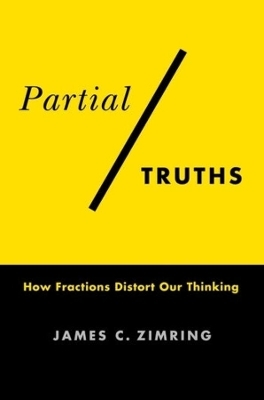
Partial Truths
Columbia University Press (Verlag)
978-0-231-20138-4 (ISBN)
A fast-food chain once tried to compete with McDonald’s quarter-pounder by introducing a third-pound hamburger—only for it to flop when consumers thought a third pound was less than a quarter pound because three is less than four. Separately, a rash of suicides by teenagers who played Dungeons and Dragons caused a panic in parents and the media. They thought D&D was causing teenage suicides—when in fact teenage D&D players died by suicide at a much lower rate than the national average. Errors of this type can be found from antiquity to the present, from the Peloponnesian War to the COVID-19 pandemic. How and why do we keep falling into these traps?
James C. Zimring argues that many of the mistakes that the human mind consistently makes boil down to misperceiving fractions. We see slews of statistics that are essentially fractions, such as percentages, probabilities, frequencies, and rates, and we tend to misinterpret them. Sometimes bad actors manipulate us by cherry-picking data or distorting how information is presented; other times, sloppy communicators inadvertently mislead us. In many cases, we fool ourselves and have only our own minds to blame. Zimring also explores the counterintuitive reason that these flaws might benefit us, demonstrating that individual error can be highly advantageous to problem solving by groups. Blending key scientific research in cognitive psychology with accessible real-life examples, Partial Truths helps readers spot the fallacies lurking in everyday information, from politics to the criminal justice system, from religion to science, from business strategies to New Age culture.
James C. Zimring is the Thomas W. Tillack Professor of Experimental Pathology at the University of Virginia School of Medicine. He is the author of What Science Is and How It Really Works (2019).
Acknowledgments
Introduction
Part I. The Problem of Misperception
1. The Fraction Problem
2. How Our Minds Fractionate the World
3. Confirmation Bias: How Your Mind Filters Evidence Based on Preexisting Beliefs
4. Bias with a Cherry on Top: Cherry-Picking the Data
Part II. The Fraction Problem in Different Arenas
5. The Criminal Justice System
6. The March to War
7. Patterns in the Static
8. Alternative and New Age Beliefs
9. The Appearance of Design in the Natural World
10. The Hard Sciences
Part III. Reversing Misperception
11. How Misperceiving the Fraction Can Be Advantageous
12. Can We Solve the Problems with Human Perception and Reasoning and Should We Even Try?
Notes
Bibliography
Index
| Erscheinungsdatum | 21.03.2022 |
|---|---|
| Zusatzinfo | 11 figures |
| Verlagsort | New York |
| Sprache | englisch |
| Maße | 156 x 235 mm |
| Themenwelt | Geisteswissenschaften ► Psychologie ► Allgemeine Psychologie |
| Geisteswissenschaften ► Psychologie ► Verhaltenstherapie | |
| Mathematik / Informatik ► Mathematik | |
| ISBN-10 | 0-231-20138-9 / 0231201389 |
| ISBN-13 | 978-0-231-20138-4 / 9780231201384 |
| Zustand | Neuware |
| Informationen gemäß Produktsicherheitsverordnung (GPSR) | |
| Haben Sie eine Frage zum Produkt? |
aus dem Bereich


